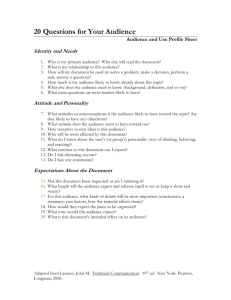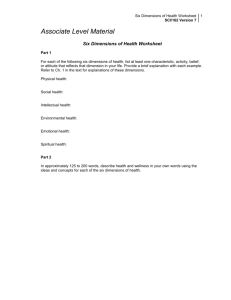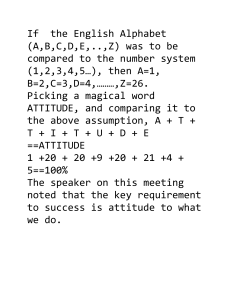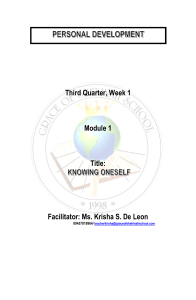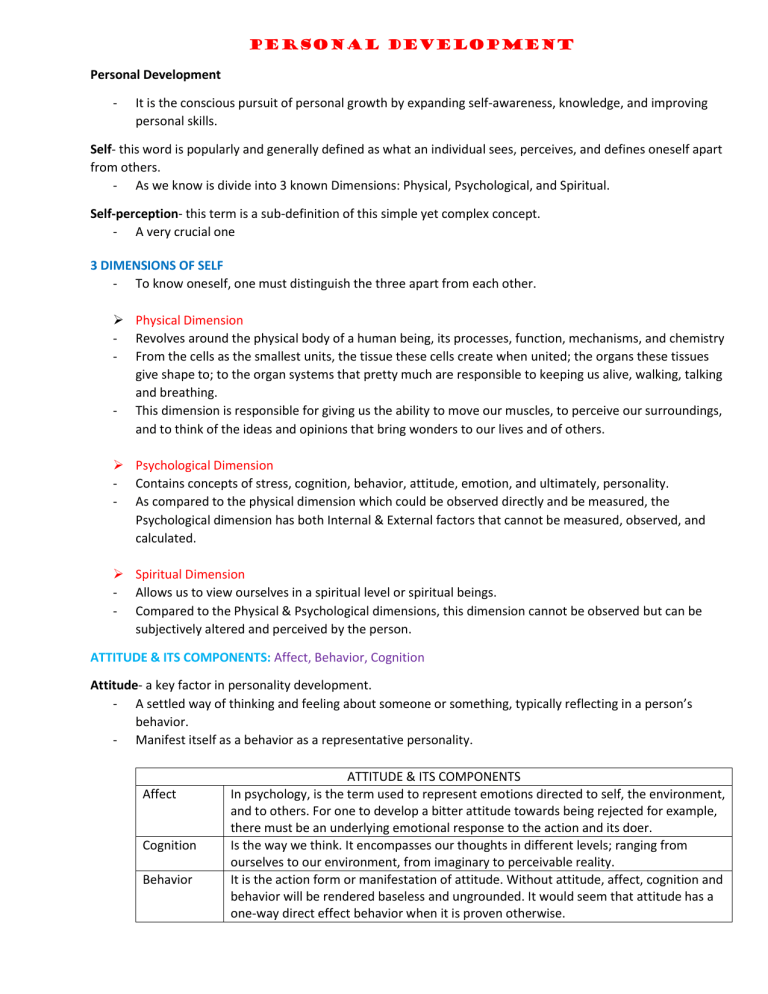
PERSONAL DEVELOPMENT Personal Development - It is the conscious pursuit of personal growth by expanding self-awareness, knowledge, and improving personal skills. Self- this word is popularly and generally defined as what an individual sees, perceives, and defines oneself apart from others. - As we know is divide into 3 known Dimensions: Physical, Psychological, and Spiritual. Self-perception- this term is a sub-definition of this simple yet complex concept. - A very crucial one 3 DIMENSIONS OF SELF - To know oneself, one must distinguish the three apart from each other. Physical Dimension - Revolves around the physical body of a human being, its processes, function, mechanisms, and chemistry - From the cells as the smallest units, the tissue these cells create when united; the organs these tissues give shape to; to the organ systems that pretty much are responsible to keeping us alive, walking, talking and breathing. - This dimension is responsible for giving us the ability to move our muscles, to perceive our surroundings, and to think of the ideas and opinions that bring wonders to our lives and of others. Psychological Dimension - Contains concepts of stress, cognition, behavior, attitude, emotion, and ultimately, personality. - As compared to the physical dimension which could be observed directly and be measured, the Psychological dimension has both Internal & External factors that cannot be measured, observed, and calculated. Spiritual Dimension - Allows us to view ourselves in a spiritual level or spiritual beings. - Compared to the Physical & Psychological dimensions, this dimension cannot be observed but can be subjectively altered and perceived by the person. ATTITUDE & ITS COMPONENTS: Affect, Behavior, Cognition Attitude- a key factor in personality development. - A settled way of thinking and feeling about someone or something, typically reflecting in a person’s behavior. - Manifest itself as a behavior as a representative personality. Affect Cognition Behavior ATTITUDE & ITS COMPONENTS In psychology, is the term used to represent emotions directed to self, the environment, and to others. For one to develop a bitter attitude towards being rejected for example, there must be an underlying emotional response to the action and its doer. Is the way we think. It encompasses our thoughts in different levels; ranging from ourselves to our environment, from imaginary to perceivable reality. It is the action form or manifestation of attitude. Without attitude, affect, cognition and behavior will be rendered baseless and ungrounded. It would seem that attitude has a one-way direct effect behavior when it is proven otherwise. SELF-CONCEPT & SELF-ESTEEM - Are two different terms that are usually mistakenly interchanged. Let us define them by aiming their key differences. Self-concept- is our cognition to ourselves, what we think and know about our identity, personality, and individuality. It requires a lot or self-evaluation and reflection to be able to say that your self-concept is high. Self-esteem- is related to self-concept but it is different. It does not focus on how we know ourselves but rather our attitude because self-esteem is how we value ourselves, given the negative or positive feedback we receive. To further differentiate Self-concept from Self-esteem, we must focus on their key differences- the involvement of emotion. Self-concept is purely or mostly informational, while Self-esteem is emotionally inclined. JOHARI’S WINDOW MODEL Purpose: to minimize the blind spot. Personal encounter (Personal experiences) Observed encounter FACTORS THAT COULD AFFECT OUR SELF: 1. Social Factors -Influence attitude heavily -the people you interact with -positive = negative (balanced) 2. Learning -learning from observation 3. Operant Conditioning -Changes of mood (e.g. liquor) 4. Modelling -Idolize
